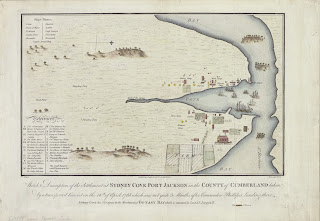John Pendergast and the Minerva
 |
| Sketch & description of the settlement at Sydney Cove Port Jackson in the County of Cumberland, 1788. Francis Fowkes, R. Cribb & S. J. Neele, Samuel John. (1789) Courtesy National Library of Australia |
In the summer of 1800, the Minerva transport ship anchored in Port Jackson, with one hundred and sixty-five male and twenty-six female convicts on board.(1) The Minerva, a 558 ton transport, left Cork on 24 August 1799, after spending at least six months embarking the convicts.(2) Onboard was our ancestor, John Pendergast, who was born in Ireland but sentenced in Dublin in April 1798 to serve a seven-year term for his crime.
 |
| Convict Indent for the Minerva 1800 Courtesy State Archives |
The year 1798 is a memorable date in Ireland’s history, when the Irish Rebellion transpired. It was one of the biggest uprisings in Ireland, when the United Irishmen group created unrest against British rule in Ireland, motivated by the revolutions in France and the colonies. Although the uprising was recorded as lasting from May to September of that year, John was sentenced in April. It appears that in March, informers intel encouraged the Government to capture some of the cream of the crop, prior to the rebellion, in special raids throughout Dublin and martial law was declared. It is believed that John was one of these rebels.
The Minerva, carrying 162 males and 26 female convicts, was noted as carrying a number of Irish rebels including Rev. Henry Fulton, General Joseph Holt and Father James Harold. William Cox, who had accepted the position of paymaster to the NSW Corps was also onboard with his wife and four sons. Joseph Salkeld was the master and it seems that the conditions must have been reasonable as only three deaths were recorded.(3)
Sources
1. Collins, David (1975). An account of the English colony in New South Wales. p. 199
2. Bateson, Charles (1985). The convict ships, 1787-1868 (2nd ed). pp. 157-9
3. Cox, William (1979). Memoirs of William Cox, J.P., Lieutenant and Paymaster of N.S.W. Corps, or 102nd Regiment, late of Clarendon, Windsor. p.22
Comments
Post a Comment